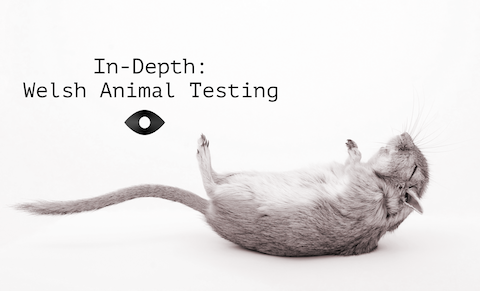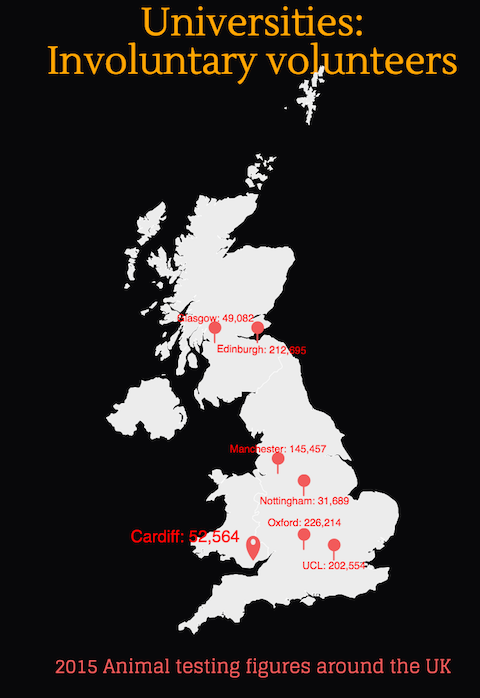An exploration into the thousands of animal experiments taking place on your doorstep
Picture having your spine crushed. Now, imagine being blinded by chemicals that irritate your skin and leave you in excruciating pain for hours at a time. This is the life of an animal restrained and forced into scientific testing for the benefit of us, humans.
Animal testing is a long-established method of research; exploring and testing new ways to progress human health in the form of medical anaesthetics, bone replacements, life support systems and organ transplants, to name a few. Universities, such as Cardiff, are key hubs for animal testing; which has attracted strong opinions in a local scientific and welfare debate.
According to the 2015 Home Office report, detailing annual animal testing statistics, universities made up 48% of total procedures in the UK – that’s 1.98 million tests on living creatures.
The necessity of such procedures is under heavy criticism from local, and national, protest groups.
Furry fury
One group opposing animal testing in the UK is Animal Justice Project (AJP).
Rachel Ward, AJP spokesperson, is rallying support for the group’s new campaign: Campus without Cruelty, which aims to hold universities to account for high animal testing figures and encourage them to reduce the number.
Cardiff University released an open report addressing animals in research in September, disclosing figures.
In regards to Cardiff, she says, “Cardiff University falls into the category of excessive animal research. Last year alone over 52, 000 animals were used in cruel studies there, such as those involving subjecting animals to severe and lethal trauma.”
Staged protests and demonstrations against testing procedures in university labs are frequent outside the university’s main building.
Campus without Cruelty began its campaign in Cardiff, receiving 750 engagements on Facebook, with 450 shares. The campaign’s latest demonstration took place at University College London on 2 December. The event attracted the attention of over 1000 people on Facebook alone.
Animal Aid, another group against animal testing, claim to have uncovered some of these “cruel” studies taking place in the UK.
They state that toxicity tests are a common form of research; these tests involve animals being force-fed chemical substances through a tube, or rubbed on a patch of shaved skin. In some of these tests animals are known to die from poisoning.
Campus criticism
Cardiff University is a signed member of the Concordat on Openness on Animal Research (COAR), which outlines four commitments – the main one details being clear about when, how and why animals are being used in research.
As a part of COAR, Cardiff University’s research objectives are made publicly available. They show that most of the tests carried out in 2015 and 2016 have been disease-related.
Animal Aid explain that in disease research, animals are physically injured or genetically modified to mimic symptoms of the illness being investigated. They say that this can entail breaking the animal’s bones, removing vital organs and subjecting them to near-drowning experiences.
In an upcoming 2016 experiment, Cardiff University are planning to inject the eyes of rats to simulate the effects of glaucoma, a disease that causes loss of vision.
During these tests the rat may experience strong pressure rises which can lead to an extensive nerve-related death.
A spokesperson for biomedical and life sciences at Cardiff University, says, “All of our research is for the advancement of medical science.
“We are very open and transparent in regards to animal research. Our tests go through numerous levels of ethical scrutiny.”
This scrutiny comes from legal requirements and initiatives, such as the 3Rs.
Reduce, refine, replace – is the motto from the National Centre for the 3Rs. Cardiff University declare that they are committed to the principle that procedures on animals for scientific research may only be carried out if there are no suitable alternatives that can replace, reduce or refine animal usage.
The 3Rs encourage organisations, like large contributors such as universities, to explore new and innovative methods of carrying out scientific research, causing less suffering to animals.
Animal advancement
A spokesperson for the University says that in certain cases animals provide the only way forward in developing knowledge and treatments for many serious conditions. These tests have saved and improved the lives of humans and animals, they said.
“We fully support and endorse the Animal Research: Reporting of In Vivo Experiments (ARRIVE) guidelines, which were developed as part of the 3Rs to improve the design, analysis and reporting of animal research.”
At a total of 52,564 procedures in 2015, AJP and supporting groups are concerned with the future of continued animal testing.
Rachel says that Cardiff Animal Rights, a local group, is helping AJP expose what is happening in Cardiff’s labs, as well as encouraging students to reject using animals in their education.
“We are urging the university to drop the cruelty and adopt non-violent research methods that do not involve the torturing of sentient beings,” she explains.
Interestingly, a petition to end Cardiff University’s animal research was considered at the National Assembly of Wales in 2012.
Unfortunately, it was deemed non-devolved, as regulation of scientific or other experimental procedures on animals are the responsibility of Westminster, the National Assembly for Wales explains.
The debate encompassing the necessity of advancing medical science and the welfare of animals is prevalent in Cardiff. Clearly there is no simple answer, as these organisations both make their arguments and contradict each other.
However, one thing is certain: animal testing is happening in University labs, and a lot of people don’t like that.



